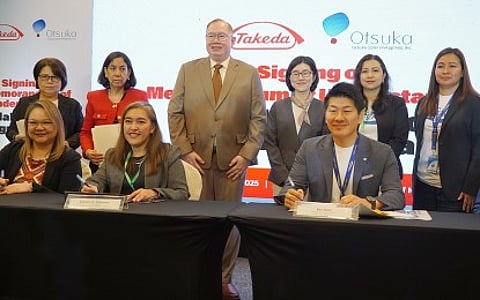
- NEWS
- the EDIT
- COMMENTARY
- BUSINESS
- LIFE
- SHOW
- ACTION
- GLOBAL GOALS
- SNAPS
- DYARYO TIRADA
- MORE

The journey of the Philippines in its battle with dengue strengthens as two Japanese health firms eye to strengthen the country’s response against the mosquito-borne disease.
Takeda Healthcare Philippines and Otsuka-Solar Philippines Inc. signed a memorandum of agreement last Thursday with the former Health Undersecretary Dr. Eric Tayag and Japan Embassy Health Attaché Dr. Fumiko Aoki.
Loreann Villanueva, country manager of Takeda Healthcare Philippines, said that the company would kick off its Dengue Initiative campaign by visiting several communities where the dengue rate is high.
“We will offer our services in raising awareness about Dengue prevention and promoting Department of Health’s (DoH) strategy on 5s, including search and destroy,” Villanueva said.
The search and destroy is a move focused on controlling the population of Aedes Aegypti, a mosquito that usually carries dengue and other diseases, by searching possible mosquito-breeding sites and destroying its breeding grounds such as stagnant water.
Villanueva added that they will prioritize areas that declared a state of calamity in 2024, as these areas typically experience the highest number of cases and deaths in the community.
Takeda Healthcare is a Japanese company founded in 1781 that focuses on providing healthcare services, including medical treatment and vaccines for both and more prevalent conditions.
Ken Saito, president and managing director of Otsuka-Solar Philippines, shared the importance of hydrating, especially in a dengue case as it will replenish the lost fluids and dehydration.
Otsuka-Solar Philippines, a subsidiary of the Otsuka Group, is best known for its flagship product, Pocari Sweat — a hydration drink enriched with electrolytes and inspired by intravenous (IV) solutions.
During his speech, Tayag highlighted the alarming rise in dengue cases from 195,600 in 2023 to 340,860 in 2024.
Additionally, Central Luzon, Metro Manila, Western Visayas and Central Visayas experienced an upward trend in dengue cases.
“The highest case fatality rate we’re observing the very young — being children nine years and below and of course, those 60 years and above,” Tayag added, as he emphasized that the disease becomes deadly in those age groups.
To eliminate dengue cases, the former DoH undersecretary emphasized the importance of cleanliness in one’s home by eliminating places in which mosquitoes could breed like tires, gutters and plant vases.
